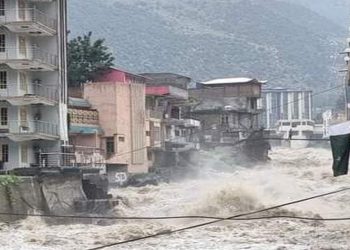Democracy entails serving the people, with general elections being crucial. In democratic countries, issues in governance are addressed democratically. Differing opinions in assemblies are seen as a democratic asset.
Democracy has led to challenges in our country, such as corruption and economic crisis. The economy, facing collapse, struggles with a substantial foreign debt of $136 billion and an internal debt of 60 trillion rupees. Economic stability is pivotal for national security.
Due to poor governance, economic recovery is elusive, that’s why the military has established the Special Investment Facilitation Council (SIFC) to ensure policy continuity and investor confidence. As the nation’s ambassador to the United Arab Emirates, I heard from the rulers frequently lamenting that investing in Pakistan would require dealing with around two dozen institutions.
Just as the military leadership had to be included, because it was deemed necessary to establish the SIFC under exceptional circumstances, in the same way, exceptional circumstances led to a specified election date. However, the public is apprehensive about the general election despite the PML(N) and other parties’ intense campaigning.
Furthermore, a number of events, including the conflict between Russia and Ukraine, which we have yet to recover from, have had a significant negative impact on the world economy. The Israel-Hamas conflict, which has lasted for the past six weeks, is another continuing incident that has resulted in the deaths of over 15,000 Palestinians, including thousands of women and children. Following the recent agreement on a temporary ceasefire in Gaza, hostages are being released by both sides. However, because of the violence on both sides, the global economy is in the state of shock.
The Zionist government has not only targeted Gaza but also Lebanon and other nearby countries, preparing to launch massive strikes as soon as the ceasefire collapses. God forbid, if this war escalates further, we will have to deal with the fallout and ramifications as well as an economic crisis. In times of economic crisis, Pakistan turns to institutions like the IMF and World Bank.
Deviating from democracy could lead to economic destruction. Our economy could collapse if military rule or dictatorship were to return. In the meantime, there is growing political rivalry between the People’s Party, the Muslim League (N), and other political groups. Political discontent may lead any party to use violence if elections are held.
Despite political rivalries, PML (N)’s efforts for seat adjustments, indicating uncertainty about winning significant seats in the country. It’s evident from the PPP and PTI’s demands for fair elections that these two big political parties are not very optimistic about their political futures. As a result, the next general elections will probably result in a coalition government.
Despite being ranked 152nd in the 2023 economic freedom index, with a score of 49.4, Pakistan’s public debt at 74.9% of GDP is concerning. Political parties claim to have solutions for economic problems, but the specifics are unclear. Delaying the general election may harm democracy, but the SIFC and military involvement aim to address economic challenges, potentially preventing a deadlock.



























